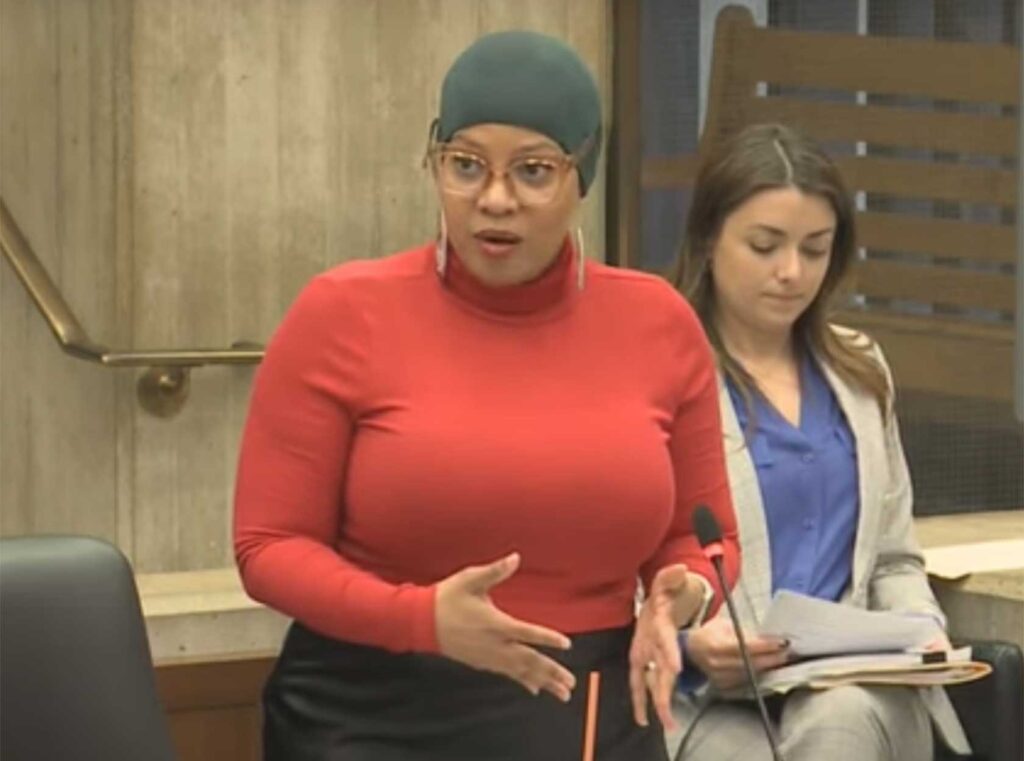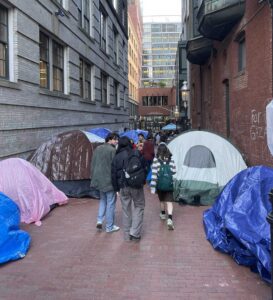City Council passes Gaza ceasefire resolution
Local Jewish groups fault language for not denouncing Hamas

The Boston City Council last week passed a resolution calling for a ceasefire in Israel’s war on Gaza, with 11 members voting in support and two against.
The vote brought to an end a months-long process during which councilors sparred over the language of the largely symbolic resolution.
“This sends a message of support to people who are working to support a ceasefire,” said the resolution’s sponsor, District 7 Councilor Tania Fernandes Anderson, who first sought to pass a resolution in October, shortly after Israel began its bombardment of the densely populated Gaza Strip in response to a Hamas incursion into southern Israel during which nearly 1,200 Israelis were killed.
More than 200 days into Israel’s war, more than 34,000 Gazans have been killed — the majority of them women and children — more than 78,000 have been wounded and more than 7,000 people are missing, with most presumed to be buried under the rubble of buildings the Israeli Defense Force leveled during its bombardment of Gaza.
Despite the overwhelming support of the Council, representatives of two local Jewish American groups issued statements denouncing the resolution on the grounds that the Council didn’t denounce Hamas, the governing body in Gaza, for its targeting of civilians during its Oct. 7 incursion.
“Rather than forthrightly address the concerns that inhibit a cessation of violence, the Boston City Council embraced a one-sided narrative that did not neatly portray the obstacles to a ceasefire, and which itself poses an obstacle to a reduction of conflict,” said American Jewish Committee New England director Robert Leikind in a statement.
District 6 Councilor Ben Weber, who advanced a ceasefire resolution in October that failed to pass in the council, said there was broad support for the resolution that passed last week.
“Most people want to see an end to the violence in Gaza,” he said during a segment of Greater Boston on GBH News. “I’ve heard mostly supportive things. Some people don’t feel like we went far enough. Others feel like we shouldn’t have addressed this to begin with. My personal belief is that I don’t want to see what is happening in Gaza continue.”
Other U.S. cities, including Atlanta, Chicago, Detroit, Oakland, Seattle, Minneapolis and St. Louis, have passed resolutions. Some of those resolutions included language condemning the Hamas incursion into Israel. An earlier draft of Fernandes Anderson’s latest resolution included language referencing Israel’s killing of Gazans as a “genocide” and referred to Israel as an “apartheid state.”
International human rights groups such as Amnesty International and some Israeli rights groups such as B’Tselem consider Israel’s division of Palestinian land into isolated enclaves and its separate set of laws governing Palestinians as a modern form of the apartheid system of government that white South Africans subjected Blacks to during the 20th century.
But the Anti-Defamation League, a pro-Israeli Jewish rights group in the U.S., maintains that the label challenges “the legitimacy of the world’s only Jewish state and its continued existence.”
In the end, Fernandes Anderson’s resolution abandoned condemnation of Hamas and the state of Israel, instead calling for an end to Israel’s bombardment, for Hamas to free the estimated 132 Israeli hostages it has detained, for Israel to free the estimated 9,000 Palestinians held in Israeli prisons, and for Israel to allow food and medical aid into Gaza, where more than 1 million Palestinians are said to be experiencing starvation.
“I think the message is clear: We do not support war against innocent civilians,” Fernandes Anderson said.
District 2 Councilor Ed Flynn and at-large Councilor Erin Murphy cast the two votes against the resolution. Flynn, who in January visited Israel and posed for a photograph with Israeli soldiers, cited the resolution’s failure to “acknowledge or condemn the Oct. 7 horrific terrorist attack by Hamas” in a social media post Monday.
Fernandes Anderson said the resolution was broad enough to include all killings of civilians, whether by Hamas or the Israelis.
“Without getting into who’s to blame, we’re condemning the killing, no matter who’s to blame,” she said. “Right is right and wrong is wrong.”
U.S. Rep. Ayanna Pressley, who has led calls for a ceasefire from Congress, issued a statement of support for the Council’s resolution.
“From Boston to Gaza, our destinies are tied and our pro-peace, pro-humanity movement continues to grow,” her statement reads. ”I’m grateful to Councilor Fernandes Anderson and her colleagues on the Boston City Council for their courage and solidarity and recognizing the work of the advocates who’ve been pushing relentlessly for an immediate and lasting ceasefire.”
The council’s push in support of a ceasefire came just days before Hamas agreed to a ceasefire agreement brokered by the Egyptian government. Israeli officials, however, rejected the agreement and began bombarding Rafah, the city in southern Gaza where more than 1 million refugees are currently sheltering.
Student protests
A week after Boston Police violently broke up a protest at Emerson College, arresting more than 100 students and injuring many, student protests were still ongoing at Harvard and MIT as of the Banner’s press deadline. Boston Mayor Michelle Wu caught flak from Emerson students during neighborhood coffee hours her office held in Roslindale and West Roxbury last week.
One student in a neck brace described to Wu how Boston police dragged students on the pavement at Boylston Place, leaving the ground bloodied.
“You don’t care about the homeless, you don’t care about Black and brown people, you don’t care about Muslims and you do not care about students,” the student said. “You do not care about refugees and students being genocided in their homeland.”
Councilors, including Council President Ruthzee Louijeune, Weber and at-large Councilor Henry Santana, condemned the police action at Emerson.
“When you send in police to stop people from engaging in political speech, you’re going to end up with violence like we saw,” Weber said during his GBH News appearance Monday. “I just hope we don’t see any more.”
Attorney Carlton Williams, who represented 75 of the protesters arrested during the clearing of the Emerson encampment, said he personally witnessed instances of students there being tackled and thrown to the ground. He noted that in other instances of civil disobedience, such as the 2017 women’s march, police and city officials aided demonstrators, blocking side streets so marchers would be protected from traffic.
“I think the city government response through the Boston Police Department was political,” he said. “The mayor saying we had a safety concern at Emerson, and then in response they used weapons to beat young people — it’s preposterous.”
Williams said almost all of his cases were either dismissed or are in the process of being dismissed.
To date, more than 200 student protestors have been arrested in Boston. Nationwide, more than 2,000 students have been arrested.








